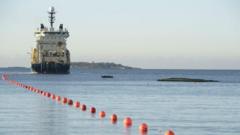
Undersea Cable Damage in Baltic Sea Raises Sabotage Concerns
German Defence Minister Boris Pistorius has described damage to two undersea telecommunications cables in the Baltic Sea as a potential act of sabotage, highlighting growing tensions in the region. The incidents involve two separate cable systems: a 1,170-kilometer telecommunications cable between Finland and Germany, and a 218-kilometer internet link between Lithuania and Sweden’s Gotland Island.
Both cables were damaged within 24 hours of each other, with Pistorius stating that “nobody believes that these cables were cut accidentally.” The timing is particularly significant given the ongoing geopolitical tensions surrounding Russia’s invasion of Ukraine.
Finnish telecommunications company Cinia confirmed that their cable may have been severed “by an outside force,” with the damage occurring near Sweden’s Oland Island. The repair process is expected to take between five to 15 days. Arelion, the company operating the Lithuania-Sweden cable, anticipates repairs will take a couple of weeks.
While some companies suggest such cable damages can occur accidentally – such as through fishing vessel anchors – the circumstances have raised serious security concerns. Swedish civil defence minister Carl-Oskar Bohlin emphasized the importance of investigating the cause of the cable failures.
The incident is reminiscent of previous infrastructure attacks in the Baltic region. The most notable was the 2022 Nord Stream gas pipeline explosion, which remains under investigation by German prosecutors. Conspiracy theories have circulated about potential involvement from Ukrainian, Russian, or US actors, though no definitive conclusions have been reached.
Internet connectivity has been minimally impacted. About one-fifth of Lithuania’s internet capacity has been reduced, but consumer services remain largely unaffected. Finnish cybersecurity expert Samuli Bergstrom noted that the Finland-Germany cable failure did not significantly disrupt internet traffic due to alternative routing options.
Germany and Finland have jointly expressed deep concern about the cable damage, suggesting it represents a threat to European security. They view the incident as potentially part of a broader “hybrid warfare” strategy, emphasizing the complex nature of modern geopolitical tensions.
This is not the first infrastructure incident in the region. In October 2023, a natural gas pipeline between Finland and Estonia was damaged, with Finnish officials ultimately attributing the incident to a Chinese container ship’s anchor.
The repeated occurrence of such infrastructure vulnerabilities has heightened awareness about the potential risks to critical communication and energy networks. While the exact cause of the recent cable damages remains unknown, the incidents underscore the fragility of undersea communication infrastructure and the ongoing geopolitical challenges in the Baltic region.
Investigations are ongoing, with authorities working to determine the precise circumstances and potential motivations behind the cable disruptions.









